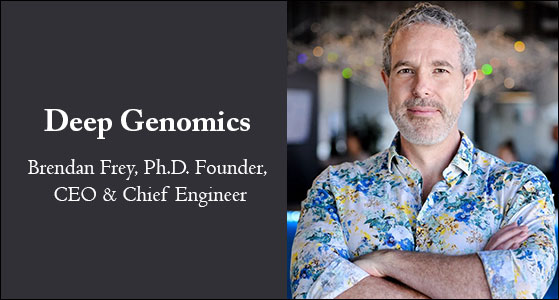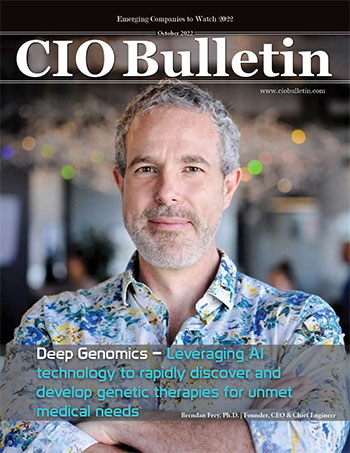Emerging Companies to Watch 2022
CIO Bulletin

"Our AI workbench is enabling the discovery of novel therapeutics for diseases with high unmet need."
Gene and cell therapies reflect a range of technical approaches and production practices. For example, there are in vivo and ex vivo approaches, as well as autologous and allogeneic approaches. Nonetheless, there are commonalities that can be exploited in biomanufacturing operations. Shared opportunities include access to many of the same vectors (including viral vectors). Shared challenges include the inability to terminally sterilize products. AI-enabled “smart manufacturing” is now beginning to support gene and cell therapy processing with an advanced digitalized integration of the manufacturing process—from supply chain management to operations control to final product track and trace. It is also empowering Industry 4.0 technologies such as the internet of things; real-time, integrated big data analytics; automated and cyber-physical systems; and advanced sensing technologies (including “soft” sensing technologies). Finally, it is supporting the widespread application of digital twins in modeling both equipment and operations. The potential of AI in realizing gene and cell therapies is remarkable, and expectations for imminent improvements in biomanufacturing operations are high.
Deep Genomics is using artificial intelligence to build a new universe of life-saving genetic therapies. At Deep Genomics, the geneticists, molecular biologists and chemists develop new ways of detecting and treating disease using their biologically accurate artificial intelligence technology. Deep Genomics has over 50 team members, with expertise in artificial intelligence, automation, cell and molecular biology, clinical development, in vitro disease models, machine learning, medicine, molecular genetics, preclinical development, organic chemistry, and software engineering. Their platform incorporates the most advanced biological and medical knowledge, is driven by the most powerful automation technologies, and is built using proprietary as well as public datasets. Their work has appeared in Science, Nature, Nature Genetics, Nature Medicine, Nature Methods, and Proceedings of the IEEE, NIPS, Bioinformatics, RECOMB, and ISMB. When other scientists and engineers publish a discovery, they evaluate it and if appropriate rapidly incorporate it into their platform.
Deep Genomics’ Approach to a Broad Portfolio in Genetic Disease
Deep Genomics is a biotechnology company that builds proprietary artificial intelligence (AI) and uses it to discover new ways to correct the effects of genetic mutations and develop personalized therapies for individuals with rare Mendelian and complex disease. In 1995, the company's founder Brendan Frey helped to lay the foundation for the highly successful artificial intelligence technology called “deep learning”. That’s the technology that’s changing everything, from farmers growing better crops to cell phones converting speech to text. In 2002, he faced a family medical crisis that led him to recognize that good drugs are based on good biology, but biology is too complex for humans to understand and accurately predict, especially at scale. So, Dr. Frey decided to focus on that problem. For the next 13 years, he and his team built artificial intelligence that could be used to successfully discover the genetic causes of disease and new therapeutic approaches to treat them. Their discoveries made the front pages of journals like Nature Magazine, and international newspapers, such as the New York Times.
By 2015, the artificial intelligence technology was so powerful that it was time to bring it to patients. The team founded Deep Genomics, whose mission is to serve patients by building and using artificial intelligence to discover and develop better treatments for genetic diseases, both rare and with large prevalence. In 2018 this artificial intelligence technology discovered how a specific Wilson Disease-causing mutation works, something human scientists hadn’t yet figured out (you can read their paper on that discovery here). Recognizing the unmet need in Wilson Disease and armed with this insight Deep Genomics launched the world’s first AI directed therapeutics program for Wilson Disease, and a portfolio of programs came behind it.
Using Artificial Intelligence to Discover Novel Therapies
For a single disease, there may be thousands of disease-causing mutations to look at, and hundreds of different ways of trying to fix the problem. On top of that, there may be hundreds of thousands to millions of potential drugs to search through, but only a few that work. Sifting through so many possibilities to find those that may help is incredibly time consuming, and complicated, for human scientists, and that’s where the artificial intelligence technology offers advantages.
There are two main ways the company use their artificial intelligence to help us develop potential medicines.
Using artificial intelligence to discover targets: First, they use artificial intelligence to rapidly examine all the possibilities and identify disease-causing mutations and ways of fixing the genetic problem. This is called target discovery and because there may be thousands of mutations and hundreds of different ways to fix the problem, having a computer do the work is a big boost.
Using artificial intelligence to design therapies: Second, Deep Genomics uses artificial intelligence to design therapeutic candidates. For a specific disease, their artificial intelligence can assess hundreds of thousands to millions of different potential targeted therapies to find the ones that are most likely the best. These are then verified in their lab, again, a big boost. The class of therapies that Deep Genomics is currently developing is called steric-blocking oligonucleotides.
Steric Blocking Oligonucleotide (SBO) Therapies
Deep Genomics' AI Workbench enables them to efficiently find drug candidates with desirable properties. They are focusing on the development and marketing of steric blocking oligonucleotides (SBOs) that target the genetic determinants of disease at the level of RNA or DNA. These genetic diseases are mediated by altered molecular phenotypes, such as transcription, splicing, translation and protein binding. Predicting those alterations is their core competency. The oligonucleotide therapeutic design space includes tens of billions of compounds, but the platform makes it possible to search this space efficiently. The team at Deep Genomics collect data on every compound identified using their platform. That includes therapeutic candidates and thousands of novel exploratory compounds. The company also collects data pertinent to biomarkers the clinical trials. All of that data is fed back into their AI system, closing the loop. They even test compounds that push the boundaries of what’s possible. This means that their platform is getting better at identifying extraordinary targets and compounds, and is doing so faster.

AI Workbench 3.0
Through iteration and positive feedback loops, prediction with the AI Workbench improves and unlocks new therapeutic opportunities. Their AI Workbench 1.0 focused on correcting RNA splicing as a means to restore protein expression. They recognized that a wide range of disorders, such as haploinsufficiencies can be potentially treated by boosting gene expression. Version 2.0 of the workbench was expanded to include seven mechanisms to increase expression and reduce the work needed to identify efficacious compounds. Deep Genomics is currently developing AI Workbench 3.0 to support target identification and drug discovery for more common, complex diseases involving multiple genes. They are now advancing a pipeline of programs in a number of areas, including neurodevelopmental, neurodegenerative and metabolic.
Brendan Frey, Ph.D. | Founder, CEO & Chief Engineer
Brendan Frey is an internationally acclaimed entrepreneur, engineer and scientist. Brendan made fundamental contributions in the fields of deep learning, genomic medicine, and information technology. He co-authored over 200 papers in these areas, including over a dozen that appeared in Nature, Science and Cell and were on multiple occasions highlighted on the front covers of those magazines. His work with Geoffrey Hinton on the 'wake-sleep algorithm' helped to launch the field of deep learning (Science 1995). His work on deep learning and on factor graphs forms the foundation of thousands of products used world-wide; for example, the WiFi telecommunications standard is based on an algorithm that Brendan co-invented.
Mr. Frey was a pioneer in developing AI systems that could accurately predict normal and pathological cell and genome biology, facilitating biomedical breakthroughs. This work led to the discovery of new biology, the founding of Deep Genomics in 2015, the first AI system for predicting pathogenic mutations and identifying therapeutic targets, and the development of new therapeutic candidates for patients with genetic disorders.
Brendan is Professor of Engineering and Medicine at the University of Toronto and is a Fellow of the American Association for the Advancement of Science, a Fellow of the Institute of Electrical and Electronic Engineers, a Senior Fellow of the Canadian Institute for Advanced Research, and a Fellow of the Royal Society of Canada. Brendan has advised the leadership of Microsoft Research on machine learning and deep learning technology, and he was a member of its Technical Advisory Board. He has held numerous researcher and professor positions at the University of Illinois at Urbana-Champaign, Cambridge University in England, the Isaac Newton Institute for Mathematical Sciences and the University of Waterloo. Mr. Frey received his PhD from the University of Toronto in 1997.

Insurance and capital markets







